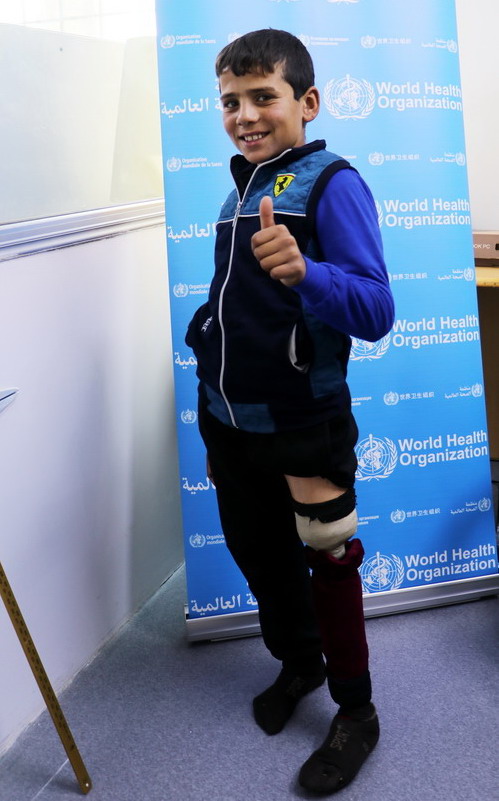The Disability and Physical Rehabilitation Centre in Damascus is one of the WHO-supported public health centres providing free-of-charge prosthetic services. Since 2018, WHO has provided the Disability and Physical Rehabilitation Centre in Damascus and three specialized nongovernmental organizations in the governorates of Damascus and Aleppo with prosthetic components and manufacturing materials for the production of 600 artificial limbs, thanks to the generous financial support of the people of Japan. In 2019, WHO provided more than 13,642 physical rehabilitation sessions and supported almost 170 beneficiaries with artificial limbs through its contracted nongovernmental organizations.
“May this centre remain forever,” said Jassem, smiling at his son. “We live almost 450 kilometers away, and we come to the centre many times each year. We’ve had to make a lot of sacrifices to find the money for travel costs, but this is the best prosthetics centre in the country,” he added.
After a few minutes, a technician takes Ali to have his leg measured. Ali gets up from his seat with the help of his artificial limb and moves to the measuring room. He waits anxiously as he watches the technicians measure the limbs of other patients. He has outgrown his artificial limb and needs a new one fitted. After being fitted with his new leg, Ali gets up on his feet and dances in a circle, laughing and spinning with joy, his eyes expressing hope and confidence for a better future.
“I’m 13 years old and in the sixth grade at school; I want to become a teacher when I grow up,” says Ali with determination and immense self-confidence. “My disability doesn’t hinder my daily activities. I go to school, help my father and I’m very keen on playing football; I can go for long walks with the help of my artificial limb,” he adds proudly.
“Ali is just one of dozens of children that the Disability and Physical Rehabilitation Centre helps every day. The centre provides free-of-charge rehabilitation services for all age groups, including the manufacturing of artificial limbs and physiotherapy” says Dr Rafif Dhieh, Head of the Disability and Physical Rehabilitation Center at the Ministry of Health.
“We thank WHO for its continuous support that allows us to help people who come to our centre from all over the country,” he adds.

“WHO is keen to support the treatment of war injuries, especially for those who have lost their limbs, with a view to reviving their hope of leading a normal and productive life,” says Dr Nima Abid, WHO Representative a.i. in the Syrian Arab Republic, before concluding:
“In fact, WHO spares no effort to provide all possible support as part of its humanitarian work to alleviate the suffering of vulnerable people and to trigger a ray of hope for a better future”.


